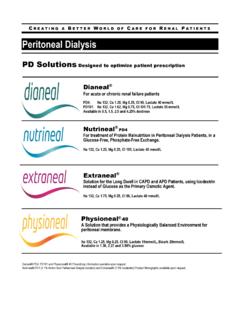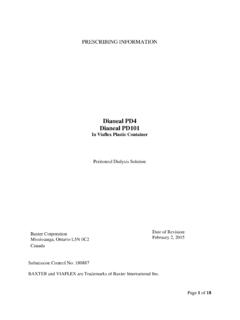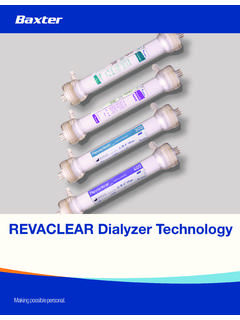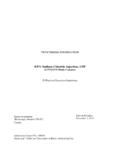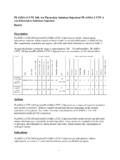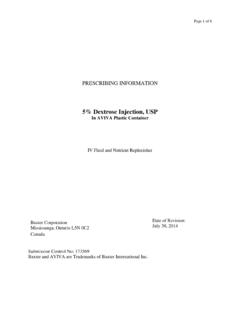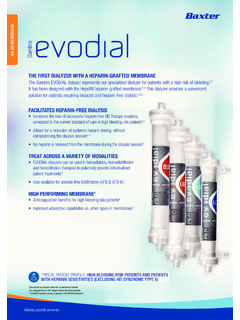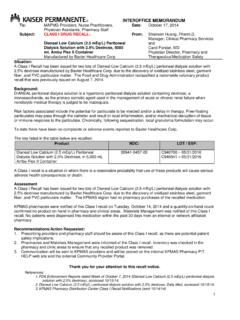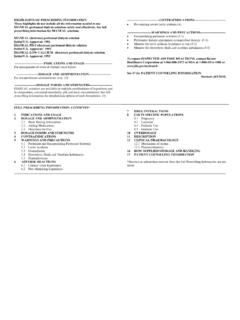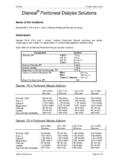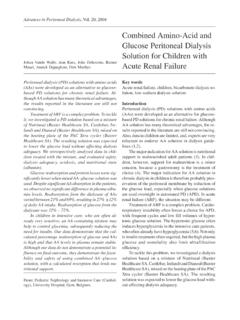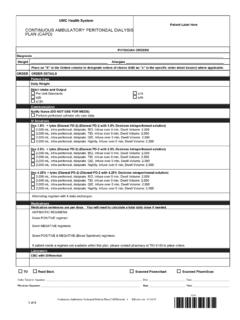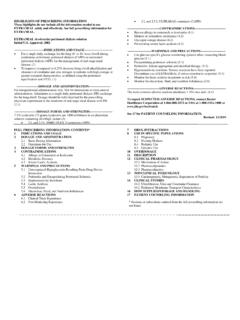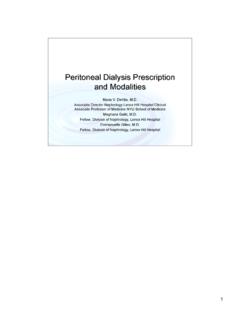Transcription of 155366 NUTRINEAL PD4 APM - Baxter
1 NUTRINEAL PD4 ( Amino Acid peritoneal dialysis Solution) Page 1 of 31 PRODUCT MONOGRAPH NUTRINEAL PD4 Amino Acid peritoneal dialysis Solution peritoneal dialysis Solution Baxter Corporation 7125 Mississauga Road Mississauga ON L5N 0C2 Date of Revision: July 30, 2012 Submission Control No: 155366 NUTRINEAL PD4 ( Amino Acid peritoneal dialysis Solution) Page 2 of 31 Table of Contents PART I: HEALTH PROFESSIONAL INFORMATION ..3 SUMMARY PRODUCT INFORMATION ..3 INDICATIONS AND CLINICAL USE ..3 CONTRAINDICATIONS ..3 WARNINGS AND PRECAUTIONS ..4 ADVERSE REACTIONS ..6 DRUG INTERACTIONS ..7 DOSAGE AND ADMINISTRATION ..8 OVERDOSAGE ..10 ACTION AND CLINICAL PHARMACOLOGY.
2 10 STORAGE AND STABILITY ..12 SPECIAL HANDLING INSTRUCTIONS ..12 DOSAGE FORMS, COMPOSITION AND PACKAGING ..12 PART II: SCIENTIFIC INFORMATION ..14 PHARMACEUTICAL INFORMATION ..14 DETAILED PHARMACOLOGY ..14 TOXICOLOGY ..21 REFERENCES ..26 PART III: CONSUMER INFORMATION ..28 NUTRINEAL PD4 ( Amino Acid peritoneal dialysis Solution) Page 3 of 31 NUTRINEAL PD4 Amino Acid peritoneal dialysis Solution PART I: HEALTH PROFESSIONAL INFORMATION SUMMARY PRODUCT INFORMATION Route of Administration Dosage Form / Strength Ingredients Intraperitoneal Solution, Amino Acids Histidine, Valine, Isoleucine, Alanine, Leucine, Arginine, Lysine, Glycine, Methionine, Proline, Phenylalanine, Serine, Threonine, Tyrosine, Tryptophan, Calcium Chloride Dihydrate, Magnesium Chloride Hexahydrate, Sodium Chloride, Sodium Lactate, Hydrochloric acid (for pH adjustment), Water for Injection.
3 INDICATIONS AND CLINICAL USE NUTRINEAL PD4 is indicated for the treatment of protein malnutrition in peritoneal dialysis patients. CONTRAINDICATIONS NUTRINEAL PD4 is contraindicated in patients with: known hypersensitivity to any amino acids in the product or to any of the excipients or components of the container. For a complete listing, see the Dosage Forms, Composition and Packaging section of the product monograph. serum urea level above 38 mmol/L uremic symptoms metabolic acidosis inborn errors of amino acid metabolism liver insufficiency severe hypokalemia uncorrectable mechanical defects that prevent effective peritoneal dialysis or increase the risk of infection documented loss of peritoneal function or extensive adhesions that compromise peritoneal function NUTRINEAL PD4 ( Amino Acid peritoneal dialysis Solution) Page 4 of 31 WARNINGS AND PRECAUTIONS Warnings Encapsulating peritoneal sclerosis (EPS) is considered to be a known, rare complication of peritoneal dialysis therapy.
4 EPS has been reported in patients using peritoneal dialysis solutions including NUTRINEAL PD4. If peritonitis occurs, the choice and dosage of antibiotics should be based upon the results of identification and sensitivity studies of the isolated organism(s) wherever possible. Prior to identification of the involved organism(s), broad-spectrum antibiotics may be indicated. If any signs or symptoms of a suspected hypersensitivity reaction develop, intraperitoneal administration of NUTRINEAL PD4 must be stopped immediately. Appropriate therapeutic countermeasures must be instituted as clinically indicated. Precautions General NUTRINEAL PD4 is intended for intraperitoneal administration only.
5 Not for intravenous administration. Do not administer if the solution is discoloured, cloudy, contains particulate matter or shows evidence of leakage or if seals are not intact. The drained fluid should be inspected for the presence of fibrin or cloudiness, which may indicate the presence of peritonitis. Protein, amino acids, water-soluble vitamins, and other medicines may be lost during peritoneal dialysis and may require replacement. peritoneal dialysis should be done with caution in patients with: 1. abdominal conditions, including disruption of the peritoneal membrane and diaphragm by surgery, from congenital anomalies or trauma until healing is complete, abdominal tumors, abdominal wall infection, hernias, fecal fistula or colostomy, large polycystic kidneys, or other conditions that compromise the integrity of the abdominal wall, abdominal surface, or intra-abdominal cavity; and 2.
6 Other conditions including aortic graft placement and severe pulmonary disease. Overinfusion of a peritoneal dialysis solution into the peritoneal cavity may be characterized by abdominal distension/abdominal pain and/or shortness of breath. Treatment of peritoneal dialysis solution overinfusion is to drain the solution from the peritoneal cavity. NUTRINEAL PD4 ( Amino Acid peritoneal dialysis Solution) Page 5 of 31 Potassium is omitted from NUTRINEAL PD4 solutions due to the risk of hyperkalemia. In situations in which there is a normal serum potassium level or hypokalemia, the addition of potassium chloride (up to a concentration of 4 mEq/L) may be indicated to prevent severe hypokalemia1 and should be made after careful evaluation of serum and total body potassium, only under the direction of a physician.
7 Additives may be incompatible. See DOSAGE & ADMINISTRATION. Carcinogenesis and Mutagenesis Long-term animal studies with NUTRINEAL PD4 have not been performed to evaluate the carcinogenic or mutagenic potential. Renal Use of NUTRINEAL PD4 can result in elevation of blood urea nitrogen (BUN), uremic signs and symptoms, metabolic acidosis, nausea and vomiting. Particular care is indicated in cases of uncompensated metabolic acidosis, severe liver dysfunction and hyperammonemia. Metabolic acidosis should be corrected before and during NUTRINEAL PD4 treatment. A portion of the amino acids in NUTRINEAL PD4 is converted to metabolic nitrogenous waste, such as urea. If dialysis is insufficient, the additional metabolic waste generated by the use of NUTRINEAL PD4 may lead to the appearance of uremic symptoms such as anorexia or vomiting.
8 Symptoms can be managed by discontinuation of NUTRINEAL PD4 or an increased dialysis dose with a non amino acid based solution. Metabolic acidosis may be treated with an oral source of alkali (such as sodium bicarbonate, calcium carbonate, or calcium acetate). Sexual Function/Reproduction Long-term animal studies with NUTRINEAL PD4 have not been performed to evaluate the effect on fertility. Special Populations Pregnant or Nursing Women: There are no adequate data from the use of NUTRINEAL PD4 in pregnant or lactating women. Physicians should carefully consider the potential risks and benefits for each specific patient before prescribing NUTRINEAL PD4. Pediatrics: Safety and effectiveness in pediatric patients have not been established.
9 Monitoring and Laboratory Tests In patients using cardiac glycosides, plasma level of potassium, calcium and magnesium must be NUTRINEAL PD4 ( Amino Acid peritoneal dialysis Solution) Page 6 of 31 carefully monitored. Patients should be carefully monitored to avoid over- and underhydration. An accurate fluid balance record must be kept and the body weight of the patient must carefully be monitored. Serum electrolyte concentrations (particularly bicarbonate, potassium, magnesium, calcium and phosphate), blood chemistry (including parathyroid hormone) and hematological parameters should be evaluated periodically. In patients with diabetes, blood glucose levels should be monitored and the dosage of insulin or other treatment for hyperglycemia should be adjusted.
10 ADVERSE REACTIONS Adverse Drug Reaction Overview The adverse reactions within this section represent those that are thought to have an association with NUTRINEAL PD4 or in conjunction with performing the peritoneal dialysis procedure. Clinical Trial Adverse Drug Reactions Because clinical trials are conducted under very specific conditions the adverse reaction rates observed in the clinical trials may not reflect the rates observed in practice and should not be compared to the rates in the clinical trials of another drug. Adverse drug reaction information from clinical trials is useful for identifying drug-related adverse events and for approximating rates. In clinical trials the following Adverse Events were observed in 5% of patients receiving NUTRINEAL PD4.
